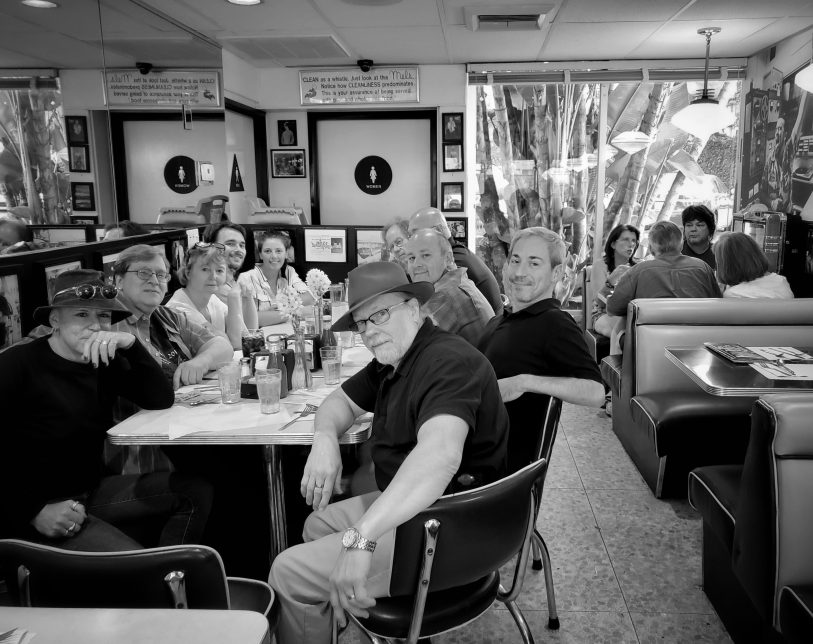I promised to do something about our L.A. trip in September.
Over the last decade or so I realized that, unexpectedly, Harlan Ellison had become a friend. One of those with whom, despite only occasional contact, you connect with on some level which eludes description. I’ve puzzled over this from time to time, but was told by people I trust finally to just go with it.
Harlan trusted me enough to come to St. Louis for a local convention and put in an appearance despite considerable obstacles. He had suffered a stroke which left him physically diminished, he had undergone a number of blows healthwise, and, frankly, he had run himself at the edge of endurance for all his life.
I’ve written elsewhere about Harlan’s influences, on me and others, and what I thought of him as a writer. To encapsulate, I think he was remarkable and unclassifiable. He loved tilting at windmills. He tried to use his stories to expand the reader’s awareness, mostly of our own limitations, and give us an experience that might alter our perspective, emotionally, ethically, politically, and personally. To grapple with an Ellison story in its best example was to, whether we knew it or not, grapple with our own inner landscapes. In my opinion, Harlan Ellison was Up There, along with the Borges and the Vidals and the Capotes, the Lessings and the MacLeans and the Le Guins and the Munros. He managed to impact science fiction so significantly that it is difficult to talk about it without a nod to the seminal Dangerous Visions anthologies.
He did not live curtained behind his literary output. He was as voluble and controversial in his public self as he was dynamic and influential in his work and this, naturally, has led to, at best, a mixed legacy. I defy anyone to be so personally consistent and engaged at that level and make no enemies, leave behind undisturbed waters, and stir no antipathy even among those sympathetic.
Be that as it may, my acquaintance with him was surprising, enlightening, and altogether positive. He credited me with being a good writer and that is something, because he did not bullshit about that.
After his visit to St. Louis, I spoke to him a couple of times. He suggested we needed to come out there, to see him, to see the Lost Aztec Temple of Mars, to talk privately. Once more. He made me wish I’d met him ten years before I had.
For a variety of reasons, we delayed. Then I saw that the 2019 Nebula Awards were to be held in Los Angeles, so I asked Donna, what would you say to that and while we’re there we can go see Harlan and Sue? Of course, yes, call him.
I didn’t. I wanted to get a couple of things settled, line up a few more ducks, so to speak. I was going to call. I was going to call that weekend.
And at work I saw the notice of his passing.
To say that 2018 was a cruel year is too imprecise. A lot of people, friends and casual acquaintances, people we knew, were fond of, had good memories of, died last year. Harlan’s passing stung in a different way than Ursula’s, which was distinct from Vic’s. But it did sting, not least because of that intended phone call and the possible visit.
When we were called to be invited to the private memorial, there was no question of not going. We arrived on Friday, checked into our hotel, and then reached out to see what was happening. “Some of us are getting together with Sue at Mel’s Diner.” We called a cab and, because it was Friday and that time of day, we inched our way over the hill to Ventura Boulevard to join Sue and close friends.
Yes, that Mel’s Diner.
Here we are:

We were just sent this picture, which Donna shot with Marty’s phone. Marty is the one sitting opposite me. We’re the only ones with hats.
It’s a moment. I don’t know everyone in the picture. Next to Marty is Jon Manzo and next to him is Sue. The huddle to the right in the corner are more friends, in particular Tim and Andrea. Greg Ketter from Dreamhaven Books is further down on the right side of the table.
We met a lot more people the next evening at the memorial. George Takei and Walter Koenig were there, Melinda Snodgrass, George R.R. Martin, Tim and Serena Powers, L. Q. Jones, David Gerrold. A lot of stories were passed around, a lot of memories. They, however, are private.
There is a whole massive piece of my personal history entangled with Harlan Ellison from before I had any possibility of calling him on the phone. It is, for some of us, awkward to make that transition from One Who Is Influenced By to a friend. I doubtless made a bit of a fool of myself tripping over my tongue. It took a while to get over the hero worship. He made it easier than it might have been, because he had no patience with it.
You can sometimes gauge the size of someone’s soul by seeing those who will remember him fondly. Harlan’s soul was pretty damn big. And by “soul” I do not mean some ethereal afterlife wisp of religiously defined phlogiston. No, I mean the very real imprint left behind on the people who knew him, either through the work or personally.
He was here and for a while he mattered. For many of us, he still matters. And for the rest, pick up one of his books and read—he’s still here.
